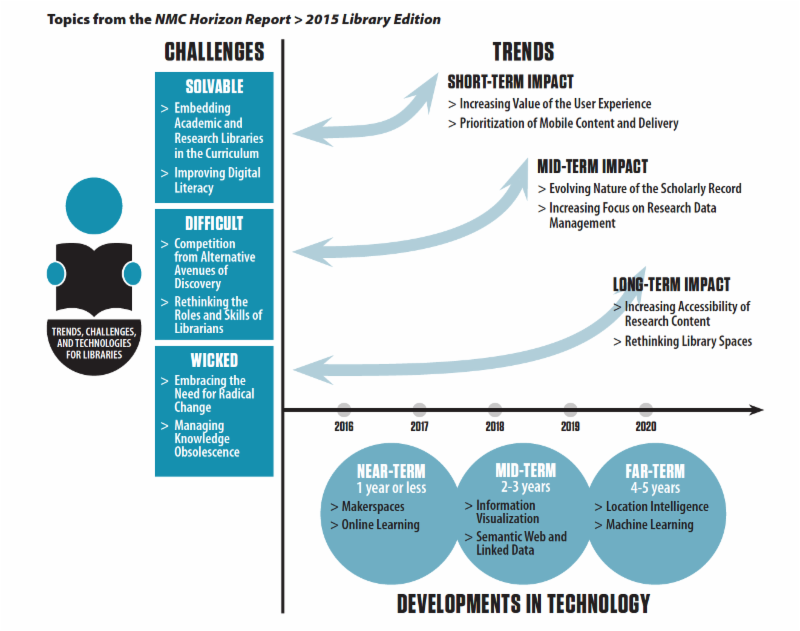Now Available: New Media Consortium Releases NMC Horizon Report > 2015 Library Edition
Released this morning by the New Media Consortium (NMC). The report is a collaboration between NMC, University of Applied Sciences (HTW) Chur, the German National Library of Science and Technology (TIB), Hannover, and ETH-Bibliothek Zürich.
The report, “explores the realm of academic and research libraries in a global context.”
Direct to Full Text Report (PDF) (Also Embedded Below)
 Video Summary
Video Summary
Key Findings: Trends and Challenges
The NMC Horizon Report > 2015 Library Edition identifies “Increasing Value of the User Experience” and “Prioritization of Mobile Content and Delivery” as short-term impact trends driving changes in academic and research libraries over the next one to two years. The “Evolving Nature of the Scholarly Record” and “Increasing Focus on Research Data Management” are mid-term impact trends expected to accelerate technology use in the next three to five years; and “Increasing Accessibility of Research Content” and “Rethinking Library Spaces” are long-term impact trends, anticipated to impact libraries for the next five years or more.
“The trends identified by the expert panel indicate that libraries are doing a better job of making their content more accessible and adapting library spaces to meet the needs of the contemporary, connected academic community,” says Rudolf Mumenthaler, Professor of Library Science at HTW Chur and co-principal investigator of the report. “The outcomes of the report are very compelling, and it is an honor for HTW Chur to be deeply involved in this project.”
Challenges Impeding Technology Adoption In Academic and Research Libraries
A number of challenges are acknowledged for presenting barriers to the mainstream use of technology in academic and research libraries. “Embedding Academic and Research Libraries in the Curriculum” and “Improving Digital Literacy” are perceived as solvable challenges – those which we both understand and know how to solve. “Competition from Alternative Avenues of Discovery” and “Rethinking the Roles and Skills of Librarians” are considered difficult challenges, which are defined as well understood but with solutions that are elusive. Described as wicked challenges are “Embracing the Need for Radical Change” and “Managing Knowledge Obsolescence,” which are complex to define, much less address.
“Do we still need libraries? Wrong question! The release of the NMC Horizon Report > 2015 Library Edition brings us many examples of the lively adoption of new technologies in libraries around the globe,” shares Andreas Kirstein, Vice Director and Head of Media and IT Services at ETH-Bibliothek and co-principal investigator of the project. “These forward-looking approaches are the answer to the better question: What kind of libraries do we need in the future?”
Important Developments in Technology for Academic and Research Libraries
Additionally, the report identifies “Makerspaces” and “Online Learning” as technologies and digital strategies that are expected to enter mainstream use in the first horizon of one year or less. “Information Visualization” along with “Semantic Web and Linked Data” are seen in the second horizon of two to three years; “Location Intelligence” as well as “Machine Learning” are seen emerging in the third horizon of four to five years.
“This report is another crucial step forward for academic and research libraries, which are now being seen as incubators for experimenting with emerging technologies and are even leading the way at many university campuses across the world,” says Lambert Heller, Head of Open Science Lab at the German National Library of Science and Technology (TIB) and co-principal investigator of the project.
2015 NMC Horizon Report Library Edition
See Also: Additional Material via Project Wiki
See Also: Direct to Last Year’s Report (2014)
Filed under: Academic Libraries, Data Files, Libraries, Management and Leadership, National Libraries, News, Open Access
About Gary Price
Gary Price (gprice@gmail.com) is a librarian, writer, consultant, and frequent conference speaker based in the Washington D.C. metro area. He earned his MLIS degree from Wayne State University in Detroit. Price has won several awards including the SLA Innovations in Technology Award and Alumnus of the Year from the Wayne St. University Library and Information Science Program. From 2006-2009 he was Director of Online Information Services at Ask.com.


